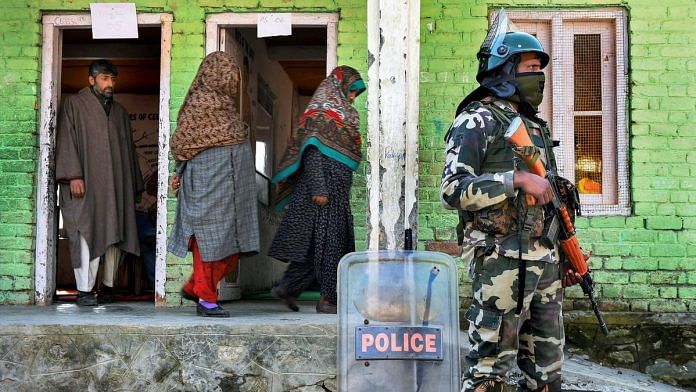New Delhi has to open its heart to accommodate dissent and divergent political thoughts.
The events of 21 November will be remembered in history as yet another day when people of Jammu and Kashmir felt humiliated and grew more wary of the democratic project in the state. Today, electoral democracy, as a principle, stands even more suspect in the eyes of the state’s young population in general and the millennial generation in particular.
As people in Kashmir followed the political developments leading to the dissolution of the Jammu and Kashmir assembly by Governor Satya Pal Malik, elders said they were experiencing a moment of déjà vu. For them, the events unfolding in the state now were no different than what they have experienced since 1947.
Those deeply concerned about the future of Kashmir sighed. The young, who have come to believe that engaging with Jammu and Kashmir’s democracy project is inconsequential, said, ‘See, we always told you so’. Those who are ever-cynical about the democratic project in Kashmir just giggled.
It was a tense evening for those who still see a credible democratic project and a peaceful dialogue on Kashmir as the only viable way out.
Also read: More killings, greater alienation: How the situation in Kashmir is slipping out of hand
Revisiting history
To most Kashmiris, the evening rekindled the painful memories of Sheikh Mohammed Abdullah’s struggles for Kashmiri political dignity. It revived the memories of 1953 when Sheikh Abdullah was dismissed as the prime minister of the state, sowing the seeds of distrust between Jammu and Kashmir and New Delhi.
It also reminded people of 1975 when the same Sheikh Abdullah signed a historic pact with Indira Gandhi, after Delhi’s decades-long political micro-management in Jammu and Kashmir.
It also took people back to 1987 when elections held in the state were allegedly rigged, and triggered a rise in militancy. For a large number of Kashmir’s intelligentsia, all these past events along with Wednesday’s episode have made the idea of democracy look laughable.
Irrespective of which party/alliance would have assumed power and whether the PDP-NC-Congress’ claim to form the government was serious, democratic principles should have been followed.
Also read: J&K governor’s move widened state trust deficit with Delhi or did it stop horse-trading?
Message to the young
Kashmir’s intelligentsia is asking a simple question yet again: why did the Governor not follow the Constitution and ask the parties, whosoever they were, to prove their majority on the floor of Jammu & Kashmir assembly? What message is being sent out to the young Kashmiri population, who feel suffocated, pushed to the wall and see any engagement with democratic project as meaningless?
Governor Satya Pal Malik listed four reasons for why he thought political parties’ claim to form the government in Jammu and Kashmir was not worth consideration.
In its first stated reason, the Raj Bhawan seems to have passed a judgement on what it called “the opposing political ideologies” of the parties staking a claim to form a government. “The coming together of such parties in a grouping is nothing but an attempt to gain power rather than to form a responsive government,” the statement read.
The second reason talks about the “reports of extensive horse trading and possible exchange of money in order to secure the support of legislators belonging to widely diverging political ideologies”.
The Jammu and Kashmir Assembly has remained in a suspended animation since 19June 2018 when the BJP announced that it is withdrawing support to the coalition with Mehbooba Mufti’s Peoples Democratic Party (PDP).
It is quite well-known that several attempts have been in motion since then to try and cobble together an alliance to form a new government in the state, excluding the PDP, the National Conference (NC) and the Congress.
Also read: 3 reasons why alliance with Mehbooba Mufti’s PDP could hit Congress, NC in Jammu & Kashmir
A troubling new narrative
Jammu and Kashmir is at a very delicate juncture of history. An increasing number of its young population is getting disillusioned with the idea of democracy. The hard line approach in dealing with divergent political aspirations and dissent is squeezing the space for respectful and result-oriented engagement between Srinagar and New Delhi. Many among the Kashmiri intelligentsia see this subversion of the remnants of democracy as hurting people’s sense of dignity.
Further, the troubling new narrative, which seeks to peg political parties on regional lines, does no good. The idea of political parties with inclusive and plural representative character, spread across all the three regions of Kashmir, Jammu and Ladakh, is under threat. This does not bode well for the multi-ethnic, multi-faith and multi-cultural mosaic of Jammu and Kashmir. It should be a matter of worry for everyone with a belief in inclusive, plural and tolerant societies, irrespective of their political aspirations.
A genuine democracy has to be given a chance in Kashmir, sooner than later. Dilli has to open its heart to accommodate dissent and divergent political thoughts. That prospect alone could create a congenial environment to address the long-term political issue of Kashmir with a peaceful, inclusive and forward-looking approach.
The author is the editor-in-chief, Ziraat Times and written the book ‘Omar Abdullah: The Burdens of Inheritance‘.




For Jack Dorsey – Just shut up and keep yourself away if you are not well informed.